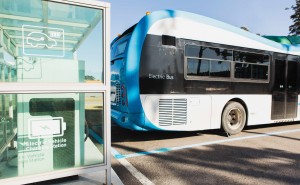Clean Energy Canada | It’s time Canada caught the electric bus
April 15, 2020

First, the good news. Globally, electric buses displaced an estimated 270,000 barrels of diesel per day last year, according to a Bloomberg New Energy Finance study. That’s a real—and growing—dent in transportation pollution.
But even though Canada is home to four prominent electric bus manufacturers, its transit and school fleets have been slow to adopt this climate-change-fighting technology. It’s a missed opportunity both to cut carbon pollution and support our electric bus companies (like Quebec’s Lion Electric and Vancouver’s GreenPower) by creating a stronger market for them at home.
Canada has relatively few electric buses on its roads, especially compared to the 16,359 fully electric buses in Shenzhen, China. There are signs of leadership at home, however. Transit authorities in Montreal and BC have committed to providing 100% zero-emission transit by 2040. For now, many Canadian-made electric buses are sold to California, leading companies to open manufacturing facilities outside Canada.
Electric buses have many advantages, not the least of which are significant fuel, environmental and health cost savings that offset higher—but quickly falling – upfront costs. By 2030, an electric bus is expected to have the same sticker price as a diesel one. Add to that lifetime fuel savings in the hundreds of thousands per bus and it’s clear where the future of transit is headed.
And yet, buses have lifespans of a decade or more. Without government support, transit authorities may be forced to buy more diesel buses, locking in obsolete technology for years to come. Vancouver transit operator TransLink has plans to electrify its bus fleet but has made it clear that doing so in a timely manner may be impossible without additional funding.
Last year, the Government of Canada signed the international Drive to Zero pledge, a commitment to support zero-emission commercial vehicles like buses and trucks. The prime minister also indicated support for 5,000 zero-emission buses in a recent mandate letter to the minister for infrastructure and communities (as of 2017, there were 67,000 motor coaches, school and transit buses in Canada). While electric buses currently cost twice as much as diesel ones (roughly $500,000 more per bus), independent analysis has shown that government rebates of roughly $250,000 could help make them competitive when factoring fuel savings. That amount goes down every year as electric bus prices fall.
Switching to electric buses is about more than just cutting pollution. It’s about saving money in the long run, creating healthier communities and helping our homegrown manufacturing industry become competitive on a global scale. So yes, it’s time Canada caught the electric bus.
This post was co-authored by Sarah Petrevan and originally appeared in Corporate Knights.